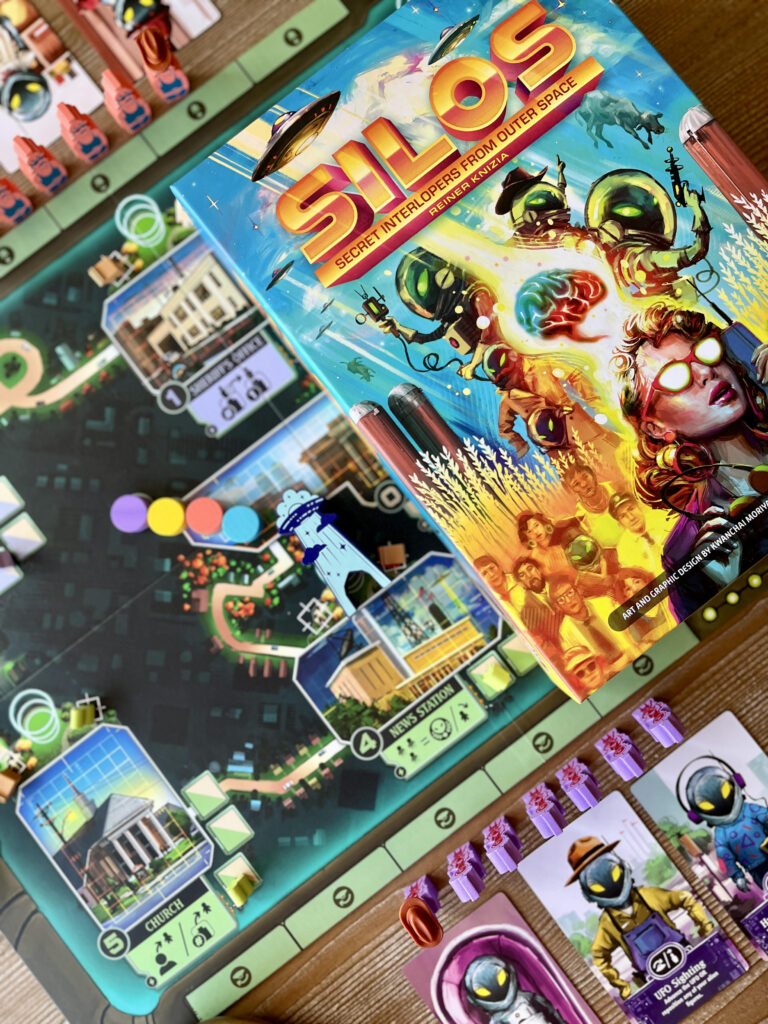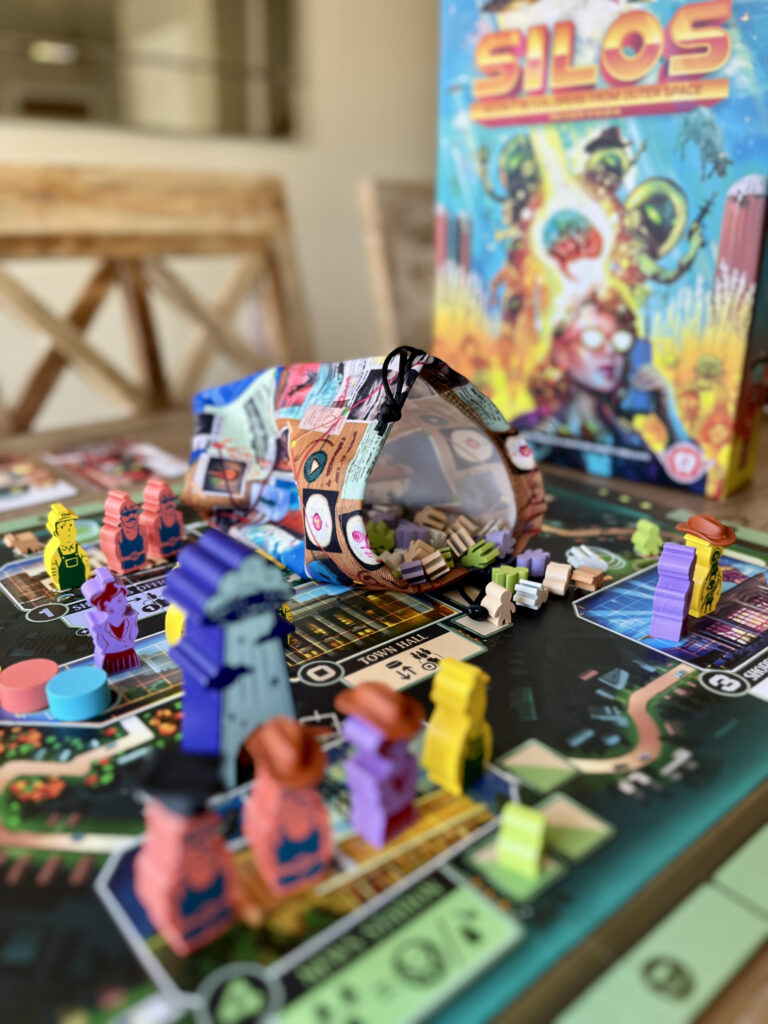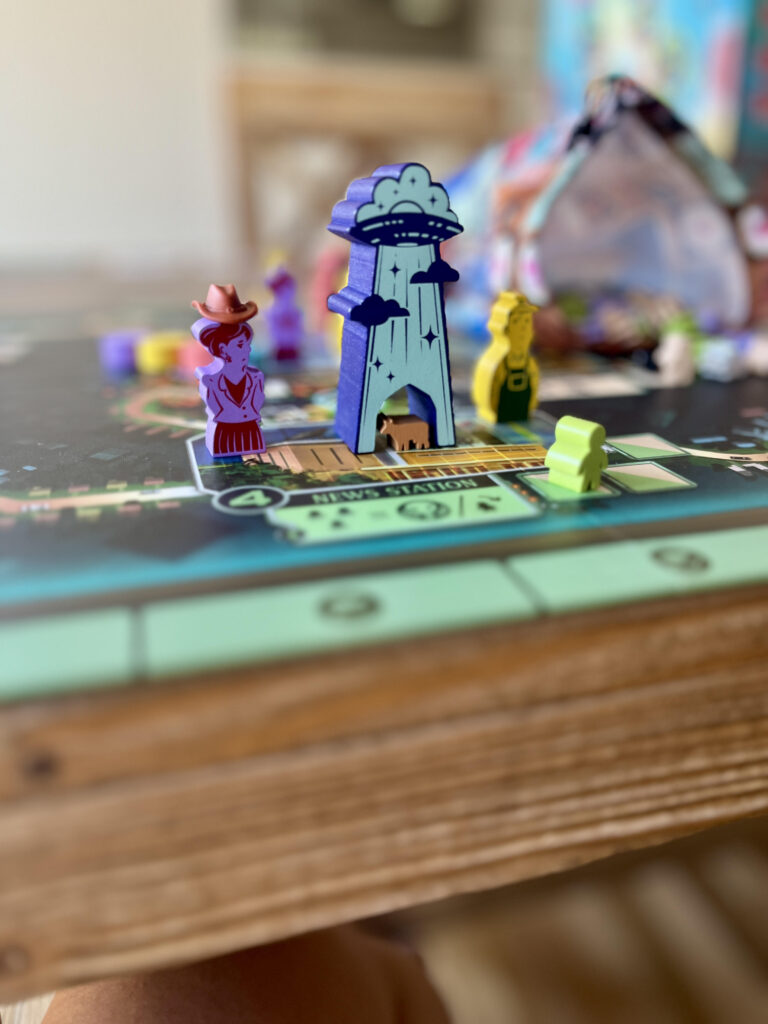Here we are with the final game in the Orbital Silos trilogy, and I know you all have been waiting with bated breath. Well, dear reader, I’m happy to announce that I think SILOS is the best game in the trilogy and it became an instant classic in our household. This is the kind of game my brain loves. It’s contained enough that you’re not struggling to hold 80 pieces of information in your head at once, but fills every corner of your mind, pleasantly stretching your brain to its fullest capacity from game one.

The problem is I’m left here wondering how best to express my absolute and complete love of this game after I wrote a gushing love letter to the last one, EGO.
But you know who doesn’t struggle to express themselves? Aliens. They’ve been inspiring generations of conspiracy theorists with nothing but cows and VHS static.
I might dependently rely on the subjunctive here to say that aliens have abducted the cultural imagination; but as any good conspiracy theorist (or mediocre philosopher) will tell you, mysteries have the tragic habit of clinging to mystery. The blurry stays blurry. The ethereal only ever manages to grab hold of more ethereal things, never the concrete. Metaphysics aside, people like realllllly really want ET to be real and so they have searched far and wide. The peak being the release of the “I Want to Believe” poster in 1993, and the valley being the disappointment, disgrace, and shameful delight upon discovering the website “alienfeet.com” was not in fact an alien movement tracker. We’ve all fallen for that one once or five times.
And finally, a group decided to get professional.
No, not the UFO hunters on cable TV…the aliens themselves. They came to Earth, they studied us, and they did what any highly advanced civilization would do to conquer a planet: they integrated themselves into our society with the goal of abducting as many cows and humans as possible.
And in SILOS, we are those aliens. We happen to believe the cows are geniuses and the humans are just stupid pawns, there for our manipulation. We maneuver across the board, swoop in with the UFO every so often, collect humans and cows, and race to dominate Earth’s fine institutions.

This is one of those games that’s hard to understand how it plays, solely from reading the rules, which I’ve learned almost always means it’s largely card-driven. Largely, it’s simple: move your aliens, play a card, trigger events, collect sets, win. The goal is to assemble four different colors of humans (representing politicians, professionals, and the like) and trade them in for Societal Power Emblems. First to five Emblems wins.
The deck drives the fun with different events. UFO Abductions hand out cows (which act as a wild piece, naturally, making it easier to complete human sets) to players with the most area-control-style influence in a location. Mind Control events let you snatch humans when locations fill up with them. Power Events fire off location abilities, doing things like rearranging turn order or promoting your aliens to be worth more for area control purposes at their location.
Because the deck is open information, you can track what’s left and time your moves like a Vegas pro. There are 12 total cards in the deck, which leaves lots of room for planning and lining up your moves just right, while working with the uncertainty.
Beyond the deck, each player has the same three one-time-use cards that are all very powerful. So powerful, in fact, that they can really turn the tide of the game if you play them right. But if you’re anything like me, you’re always cursing yourself for using them too early, no matter how hard you try to have self control. Them’s the breaks! But this is a crucial way to help mitigate the randomness of the common deck, trying to save it for those final moments when you’re so dang close.

The design genius shows itself right from the beginning. The game quickly reveals its layers and it’s pretty thinky. It’s a game that lets you feel both clever and stupid, allowing you to hang yourself on your own poor decisions. But those decisions change game to game based on the decisions of the other players. There’s never one clear path to winning in this game because, like every great Knizia game, the players are playing each other. You need to adjust to what’s happening on the board around you, and that’s sometimes hard to do.
It perfectly balances the silliness and the sharp decisions all the way through. It’s as genuinely hilarious to collect the cows as it is to lose because the opponent happened to draw the exact card needed. The game runs around an hour, so we didn’t find ourselves frustrated to lose on a card draw, but be aware it’s a possibility. However, the game gives you several levers to pull if you want to avoid that fate, and you’ll see it as you look back on the game and plot your strategy for the next one.
Ultimately, I think SILOS is my favorite in the end because it perfectly marries the theme to the gameplay. This is impressive, considering it’s a re-creation of the original Municipium. I have not played that version, and while I generally feel that theme is not the most important piece to Knizia games (as discussed in my EGO review), the ones that do nail it take it above and beyond.
So, the trilogy closes, not with a whimper, but with an “ACK ACK”. It swooped in like a UFO and left behind a game that’s funny, clever, and destined to stay in the rotation for a long time. Bitewing’s production on all three games has been stellar, with incredible artwork, quality pieces, and wonderful table presence. The production matches the gameplay beat for beat, elevating the experience without ever getting in the way. That’s as much as I can ask for.
At least…I think that was me talking. Hard to tell with all the mind control rays lately.
Thank you to Bitewing for the review copy